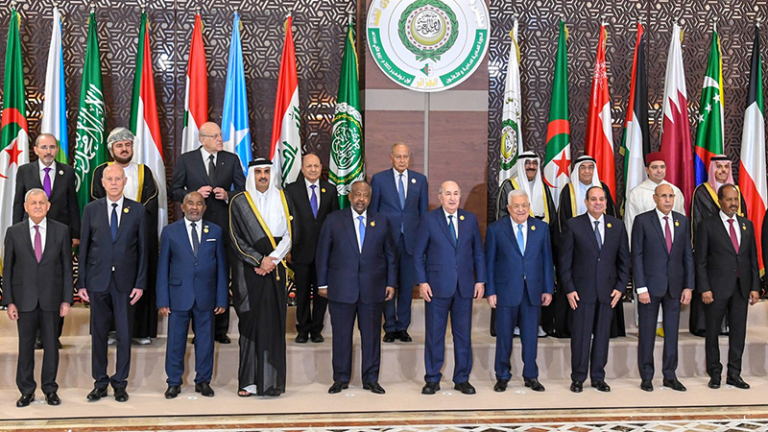
Some in the Arab region and the international community seem to expect that after the Israeli war on Gaza and the destruction of most life systems in the Strip, the United States and others, as repeatedly declared, will spearhead a major new effort to negotiate a permanent and comprehensive peace agreement based on the two-state concept between Israel and Palestine. Said accord would come on the heels of the grotesque and brutal nature and extent of the ongoing conflict between Israel and Hamas and will only succeed if the underlying core grievances of both sides—but especially the occupied, assaulted, and besieged Palestinians—are addressed justly and equitably.
The terms of a negotiated, permanent settlement are likely to be among the ideas that will be discussed by the follow-up committee of foreign ministers that emerged from last October’s extraordinary joint Arab-Islamic summit in Saudi Arabia on the war between Israel and Hamas, and that will visit Washington this week. It is important to ascertain whether this visit is a pivotal political and diplomatic moment in the Israeli-Palestinian and Arab-Israeli conflicts, or just another pro forma, symbolic motion by weak Arab and Islamic countries that ask the world to help them stop the ongoing bloodletting in Gaza, now beginning its third month.
The protagonists must resolve issues that have plagued the region during the past 100 years—ever since the League of Nations in 1922 formally gave the United Kingdom the responsibility for the mandate of historic Palestine, between the Jordan River and the Mediterranean Sea. This century-long battle has only become more vicious since then, resulted in the establishment of an apartheid Zionist state in Palestine, spawned powerful new non-state actors like Hezbollah and Hamas, and expanded tensions in the region to include the Arab world, Iran, and Turkey.
If the follow-up committee comes to Washington to discuss with the United States a more serious approach to negotiating permanent Arab-Israeli and Palestinian-Israeli peace, it should explore relaunching an enhanced version of the 2002 Arab Peace Initiative (API) that promised a comprehensive peace, but received no Israeli and little American response. The region continues to suffer the consequences of unresolved core issues, the most critical of which are the forced refugee status and national disenfranchisement of the Palestinians, the future of Jerusalem, borders between Israel and Palestine, and water, the Israeli occupation and annexation of Arab lands, mutual security guarantees, and nonstop settler-colonial expansion on Palestinian land. In exchange for a resolution of these core issues, the API pledged full Arab recognition of Israel within its June 4, 1967, borders and normal diplomatic, political, and economic relations.
If another effort to negotiate a permanent peace agreement is imminent, all sides who genuinely seek just peace and security should consider adopting a few core principles that would apply to Palestinians and Israelis, to avoid repeating the failures of past peace-making efforts. These principles could shape a comprehensive negotiating process as well as the contents of permanent peace agreements that the negotiators will address, along with appropriate implementation mechanisms and time schedules that all parties pledge to respect.
Necessary Addendums to the API
Here are some principles that expand on the 2002 Arab Peace Initiative, for protagonists and any serious mediators to ponder.
Equal rights and sovereignty: Arab-Israeli and Palestinian-Israeli negotiations must be based on non-colonial foundations; the negotiating parties and the mediators must accept the principle of total equality in their demands, rights, and outcomes. No side must expect to enjoy greater or a priori rights over the other. Concomitantly, since the conflict started in Palestine, and will be resolved only when Israelis and Palestinians enjoy equal national and personal rights, two sovereign and independent states, one Israeli and one Palestinian, must be allowed to exist side-by-side with defined and agreed borders.
Ending the occupation and annexation: As the 2002 API stated, all Palestinian and Arab lands occupied in 1967 must be returned, with any exceptions, swaps, or other adjustments agreed by the sides. This specifically applies to East Jerusalem, the West Bank, the Gaza Strip, and the Syrian Golan Heights.
Equitable security guarantees: Both Israeli and Palestinian states must accept the principles of nonviolent conflict resolution and enjoy negotiated security guarantees of equal nature and magnitude and that protect their full sovereign rights. Any security arrangements involving external forces must guarantee that said forces are stationed on both sides of the borders in question, so they protect Israeli and Palestinian populations simultaneously. Both sides need protection, not only Israel.
Self-governance must be guaranteed: The Palestinians can and must govern themselves, and do not need foreign powers supervising them. In the initial stages of moving to a permanent peace, Palestinians can decide through elections how to form a transitional or provisional government that represents all of Palestinian society, most likely through a serious national unity government. A willing partner committed to peace is also required in Israel, which the Israelis must define on their own, likely leading to a new government.
Rights and protections: The negotiations for a lasting peace agreement should also include a parallel ring of mechanisms that would allow all the main parties, as well as key countries around the world, to work together on several related issues that matter deeply to the negotiators. These should include working groups and consortia of states, perhaps via existing global organizations, to fight anti-Semitism, Islamophobia, apartheid and racial discrimination, and the silencing and criminalizing of Palestinian voices in Israel/Palestine and globally. This could significantly assure the negotiating parties that their wider concerns will be addressed collectively by the international community, with equal force.
Choice of Negotiators: The Palestinians must fully determine their own negotiators and be an equal and central party at the table. Israel or the United States, or any other party, cannot define who the Palestinian negotiators might be.
Simultaneous implementation: All stages of implementing any peace agreement should be achieved simultaneously, and not with one party making initial concessions while the other continues its colonial ways. If phased progress toward a final peace arrangement is required, it should apply to both sides simultaneously, so they both keep moving toward the agreed permanent peace.
Overall process management: The negotiations should occur under the broad aegis of the United Nations Security Council and the General Assembly, and not the sole domain of the United States. Organizations such as the Organization for Economic Cooperation and Development and/or the Islamic Conference Organization—or some other such combination—could be integrated into the wider negotiating mechanism to assure all sides of even-handed political management of the discussions, alongside economic incentives and imperatives.
Peace, justice, and security for all can only happen when the most vital concerns and fears of all sides are taken seriously and addressed sincerely. It is hard to know when such a moment might be possible. But its success will require much more rigorous and mature peace-making than has happened to date in the Palestinian-Israeli conflict and its associated conflicts in the region. It is hoped these suggestions might stimulate some new thinking among the parties themselves and those interested in resolving the Palestinian-Israeli and Arab-Israeli conflicts.
The views expressed in this publication are the author’s own and do not necessarily reflect the position of Arab Center Washington DC, its staff, or its Board of Directors.
Featured image credit: Flickr/Gigi Ibrahim

